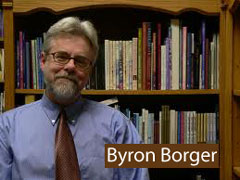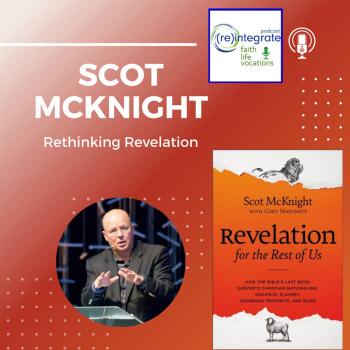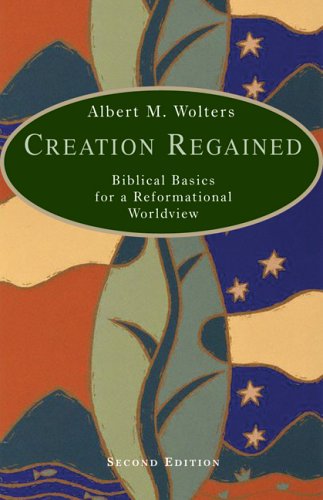 The biblical narrative [ (1) Creation, (2) Fall, (3) Redemption, (4) Consummation ] explains more and carries more useful freight than most of us realize. It is the story of the fully good creation invaded by profound sin and curse but being fully redeemed and restored by the God of faithful covenant. Albert Wolter’s Creation Regained: Biblical Basics for a Reformational Worldview (Eerdmans; $14.00) explores the significance of the full-orbed realities of this Christian worldview.
The biblical narrative [ (1) Creation, (2) Fall, (3) Redemption, (4) Consummation ] explains more and carries more useful freight than most of us realize. It is the story of the fully good creation invaded by profound sin and curse but being fully redeemed and restored by the God of faithful covenant. Albert Wolter’s Creation Regained: Biblical Basics for a Reformational Worldview (Eerdmans; $14.00) explores the significance of the full-orbed realities of this Christian worldview.
His famous chapter on “structure and direction” is essential reading to appreciate the best proposals of a restorative vision of Christianity, and is a good tool to help us explore what is creationally good about something (money, sex, sports, politics, art, race) and what is misdirected and dysfunctional. Any social reformer needs to know what is good and what is bad, what should be changed and what should remain, in her arena of influence and no one book lays a foundation for helping us with that cultural discernment as does Creation Regained.
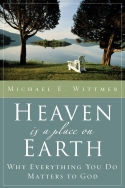 Books that build upon Wolters’ work include Michael Witmer’s excellent book Heaven is a Place on Earth: Why All You Do Matters to God (Zondervan; $16.99.) and the equally important The Transforming Vision: Shaping a Christian Worldview by Brian Walsh & Richard Middleton (IVP; $16.00). Also, Paul Marshall’s Heaven is Not My Home: Living in the NOW of God’s Creation is a wonderful book, explaining not only the Creation-Fall-Redemption story but also supplying the so what – how this affects all our endeavors, be it art, technology, politics, play, and caring for the creation.
Books that build upon Wolters’ work include Michael Witmer’s excellent book Heaven is a Place on Earth: Why All You Do Matters to God (Zondervan; $16.99.) and the equally important The Transforming Vision: Shaping a Christian Worldview by Brian Walsh & Richard Middleton (IVP; $16.00). Also, Paul Marshall’s Heaven is Not My Home: Living in the NOW of God’s Creation is a wonderful book, explaining not only the Creation-Fall-Redemption story but also supplying the so what – how this affects all our endeavors, be it art, technology, politics, play, and caring for the creation.
We also sell a bunch of Dr. Richard Mouw’s little Bible study, When the Kings Come Marching In: Isaiah and the New Jerusalem (Eerdmans; $15.00) that shows the Biblical hope of new creation, including the (purified) cultural artifacts that will endure into our bodily existence in the (re)newed city of God. It remains a vital resource for the development of a Biblically informed view of culture, justice, and hope. It is a book that reminds us of the final climax of the plot of the Scriptures.
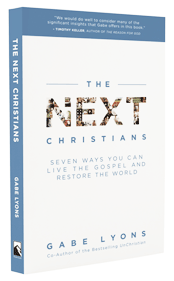 Gabe Lyons’ The Next Christians: Seven Ways You Can Live the Gospel and Restore the World (Multnomah; $14.99) is excellent because it captures the biblical restorative vision of the biblical narrative in fresh language (he calls it “the four-chapter gospel”) with tons of great stories. He then gives seven ways Christians can change our modus operandi in order to respond to God’s call to be Restorers. The Next Christians, as much as any recent book, shows the ways in which a vision of being restorers of broken culture inspires this rising generation of post-culture-wars young evangelicals.
Gabe Lyons’ The Next Christians: Seven Ways You Can Live the Gospel and Restore the World (Multnomah; $14.99) is excellent because it captures the biblical restorative vision of the biblical narrative in fresh language (he calls it “the four-chapter gospel”) with tons of great stories. He then gives seven ways Christians can change our modus operandi in order to respond to God’s call to be Restorers. The Next Christians, as much as any recent book, shows the ways in which a vision of being restorers of broken culture inspires this rising generation of post-culture-wars young evangelicals.
In (Re)Thinking Worldview: Learning to Think, Live, and Speak in This World (Crossway; $16.99), J. Mark Bertrand takes the “worldview conversation” a step further down the path. I never tire about hearing how this wholistic gospel story affects the ways and practices and ethics of daily life as we work and witness in our modern world. Mark shows how worldview is not just about “thinking” but about living and speaking winsomely about the story we find ourselves in. Sharp stuff, to be sure!
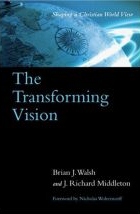 Really understanding how the Biblical narrative shapes how we lean into life and gives us a way to imagine how life ought to be, giving us ways to evaluate the principalities and powers of our world, without becoming revolutionaries who just want to tear everything down, simply necessitates pondering Wolters, Walsh & Middleton, Betrand and other similar books. If you’ve followed our store for long you may know that I’m particularly fond of Walsh’s several books–all which emerge in one way or another from this first, important one he co-wrote with Richard Middleton. (Yes, it is true: N.T. Wright dedicated his first really big volume, The New Testament and the People of God, to Brian, and developed that whole first section about worldviews from Walsh’s work in The Transforming Vision and elsewhere. So even brainy world-class theological stars like Wright admit a debt to Walsh).
Really understanding how the Biblical narrative shapes how we lean into life and gives us a way to imagine how life ought to be, giving us ways to evaluate the principalities and powers of our world, without becoming revolutionaries who just want to tear everything down, simply necessitates pondering Wolters, Walsh & Middleton, Betrand and other similar books. If you’ve followed our store for long you may know that I’m particularly fond of Walsh’s several books–all which emerge in one way or another from this first, important one he co-wrote with Richard Middleton. (Yes, it is true: N.T. Wright dedicated his first really big volume, The New Testament and the People of God, to Brian, and developed that whole first section about worldviews from Walsh’s work in The Transforming Vision and elsewhere. So even brainy world-class theological stars like Wright admit a debt to Walsh).
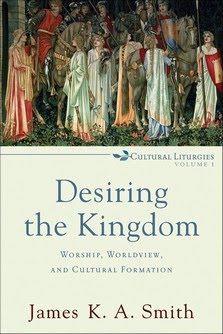 You should know, too, that the person who has advanced a somewhat new understanding of worldviews and how they work (what some might call a more thick account) is philosopher James K.A. Smith. Desiring the Kingdom: Worship, Worldview, and Cultural Formation (BakerAcademic; $21.99) is doubtlessly the most important book on this topic in decades and one simply cannot be conversant in the latest sorts of socio-theological conversations without knowing it. There are two other massive volumes coming, making it eventually a trilogy, so you should man up (can women, “man up” — I think so!) and just get it. It is very, very well done.
You should know, too, that the person who has advanced a somewhat new understanding of worldviews and how they work (what some might call a more thick account) is philosopher James K.A. Smith. Desiring the Kingdom: Worship, Worldview, and Cultural Formation (BakerAcademic; $21.99) is doubtlessly the most important book on this topic in decades and one simply cannot be conversant in the latest sorts of socio-theological conversations without knowing it. There are two other massive volumes coming, making it eventually a trilogy, so you should man up (can women, “man up” — I think so!) and just get it. It is very, very well done.
I believe that if you read some of this stuff and come to grasp it well, it will truly be a game-changer, as they say. If you have any questions about these or other books, please don’t hesitate to email or call me. I am at the service of all of you who read this website and are serious about reintegrating your faith with your work!
